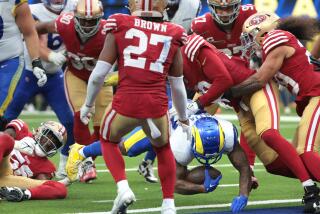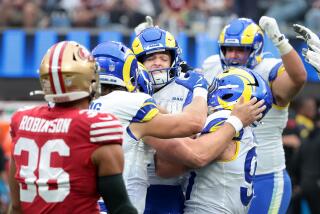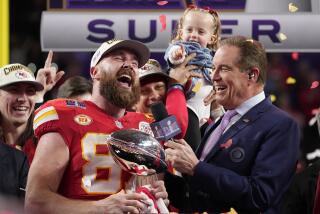PRO FOOTBALL : A Game Both Defenses Played Relentlessly
SAN FRANCISCO — As entertainment, defensive football games leave a great deal to be desired, ordinarily. But this was one of the most spectacular defensive games of recent years--considering the quality of the opponents, who were each 10-1 at the opening kickoff.
Before and after quarterback Joe Montana completed his one good pass to win it for the San Francisco 49ers in the second quarter Monday night, 7-3, the New York Giants stopped him repeatedly and relentlessly.
Even more successfully, through all four quarters, the 49er defense attacked Giant quarterback Phil Simms and his running backs, on their own land or at midfield, mostly, but on the goal line when necessary. And it was necessary twice.
The 49ers, to be sure, have been a defensive team basically since Bill Walsh put them together 12 years ago. The striking power of their offense usually has obscured that fact. But tough defense was Walsh’s goal from the start, and this was one more payoff.
More unbelievable was the way the Giants controlled Montana’s short passing game. If you were seeing him for the first time in this game, there was no way to evaluate him as a passer because he seldom had an open receiver to throw to.
The Giant rush erased Montana’s deep passing threat, smashing in before he could set to throw. And on shorter 49er patterns, New York’s defensive backs were reading Montana instead of his receivers. The instant he planted to throw, they sprinted directly at 49er wide receivers Jerry Rice and John Taylor, or the tight ends or backs--and, as a rule, got there ahead of the ball.
It was, however, the 49er defense that made the game’s four decisive plays with its second goal- line stand--this one at the San Francisco nine-yard line in the last five minutes.
A lucky play--a 20-yard run with a Simms fumble by one of his teammates, Ottis Anderson--put the Giants down there. But no farther.
On first down, 49er nose tackle Michael Carter rushed Simms into his fifth throwaway of the game. On second down, 49er cornerback Don Griffin got in the way of Giant receiver Mark Ingram. Incomplete.
On third down, 49er safety Ronnie Lott, the club’s defensive leader, got a hand on a touchdown-bound throw to Giant tight end Mark Bavaro. Still another incomplete. And on fourth down, the left-side cornerback, Darryl Pollard, broke up a slant pass to Giant receiver Lionel Manuel.
The Giants proved that a determined, disciplined, well-coached defense can control Montana most of the time. Say 95% of the time.
But if you don’t get him every time, he’ll get you.
On the series after the Giants had laboriously moved into a 3-0 lead, Montana won the game with his one true pass of a strange night in Candlestick Park.
It went 23 yards to Taylor in the end zone, and it succeeded because it was low and away to the 49er receiver, who went to his knees to catch it as Giant cornerback Mark Collins closed on him.
That time the Giants rushed Montana with only three linemen and no linebackers, and, for a change, his offensive line picked them all up.
There were eight Giants in the secondary, but Montana tipped them off balance with a fake throw to Rice before delivering to Taylor.
On the game’s only touchdown drive, the 49ers skipped 63 yards in five plays, once getting 31 yards from halfback Roger Craig on a short pass from Montana on third and six.
Craig, who left with an injured hip in the fourth quarter, had criticized 49er Coach George Seifert during the week, questioning his commitment to the club’s running game. Seifert responded by trying to run Craig, sometimes too often. The old Craig magic, though, wasn’t there.
Oddly enough, the 49ers’ ground game, which has been missing all season, finally appeared in the last 3:55, when Craig’s replacement, rookie Dexter Carter, gave it to them.
Carter, who weighs 170 pounds, and reserve fullback Harry Sydney ran for two first downs at the end to keep the ball out of Simms’ hands until the clock could catch him.
The 49ers might not have pulled it out if the Giants had played more daringly on offense. The ultra-conservative New York game plan was the undoing of Coach Bill Parcells.
On a passing down in the first quarter, with third and four at the 49er 29, the Giants attempted to fool the San Francisco defense with a run out of the shotgun formation by David Meggett, who lost four yards to take them out of field-goal range.
In the second quarter, after the Giants got to the 49er three-yard line on a lucky play--a pass deflected by Giant safety Dave Waymer to wide receiver Stephen Baker--they died there on another passing down, third and goal, when they decided to run Anderson, who gained nothing.
In the fourth quarter of a game they were losing by four points, the Giants, at midfield and moving, again called for Anderson, and again misfired.
Parcells is a gambler who calls fourth-down running plays more often than any other NFL coach.
And in the last four minutes of this game, he gambled, sort of, with a fourth-down pass from the 49er nine-yard line at a moment when, if he’d played for a field goal, instead, he could have won by adding another field goal at game’s end.
But there’s a difference between gambling and playing daring football. A fourth-down run or an occasional fourth-down pass isn’t the kind of sound-but-deceptive football the 49ers have played for the last 12 years.
That might be why the 49ers now have a better chance than the Giants to get to the Super Bowl.
More to Read
Go beyond the scoreboard
Get the latest on L.A.'s teams in the daily Sports Report newsletter.
You may occasionally receive promotional content from the Los Angeles Times.










